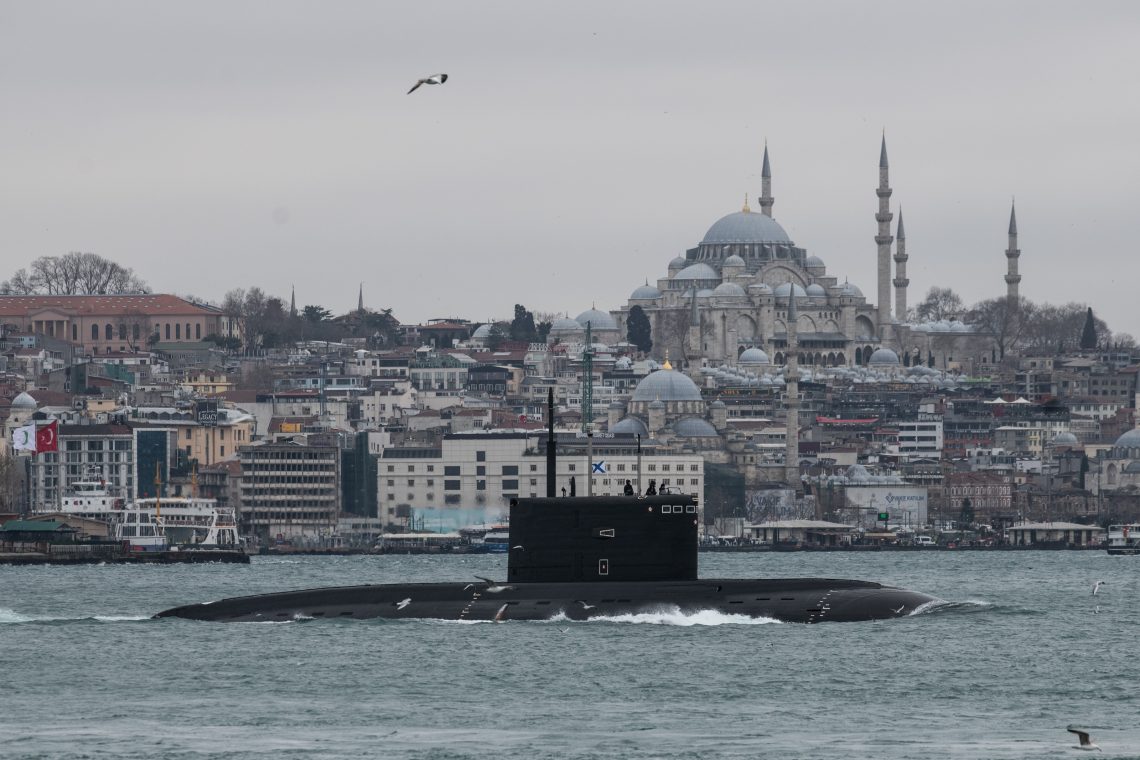The Black Sea and Turkey in focus
The war in Ukraine has altered the security landscape of the Black Sea region, but so far ties between Russia and Turkey have withstood the shock.

In a nutshell
- The Black Sea is a crucial seaway for both Ukraine and Russia
- Turkey is likely to play an important role in regional developments
- An escalation of the conflict in Ukraine could upend the region
As the Ukraine crisis is shifting the balance of power along the Black Sea’s northern shores, the wider region is coming into focus.
The Black Sea is a huge natural buffer between the Slavic world to the north and Turkey to the south. At the same time, it represents – both for Russia and Ukraine – a safe passageway toward the oceans. On its waves, millions of tons of wheat, flour, sunflower oil, as well as crude oil and other merchandise are shipped to the Mediterranean, and from there to anywhere in the world. Under the sea, pipelines pump Russian gas to Turkey and Southeastern Europe via TurkStream. Istanbul, Europe’s biggest metropolis, is the gateway through which all vessels to or from the Black Sea pass.
Changing neighborhood
Occupying the Crimean Peninsula since 2014, Russian troops are now attacking along larger and larger stretches of Ukraine’s Black Sea coast. Russia could soon turn out to be Turkey’s only de facto neighbor to the north. The Kremlin is also the determining military force in Syria, with which Turkey shares a 900-kilometer border to the south.
Turkey and Russia’s long-serving leaders, Vladimir Putin and Recep Tayyip Erdogan, have come to know each other well over the years and treat each other with respect.
Both Moscow and Ankara are treading extremely carefully, given Turkey’s NATO membership and the many other controversial issues that divide them. Still, almost equally strong shared interests bind them together. For Russia, unhindered access to the Mediterranean is of fundamental importance for trade and for supplying military forces stationed in Syria.
In many instances, Russia and Ukraine rank similarly high for Turkey (for example, when it comes to food trade or tourism). Turkish trade with Russia and Ukraine taken together recently amounted to roughly US$ 40 billion per year. Turkish construction businesses alone earned about $13 billion yearly in both countries. Russia and Ukraine provide 80 percent of Turkey’s wheat imports and 65 percent of its sunflower oil imports. Some 7 million tourists from Russia and Ukraine come to Turkey annually, representing 27 percent of the aggregate foreign overnight stays.
Facts & figures
In other matters, Russia carries more weight. ROSATOM is building Turkey’s first nuclear power plant, meant to start operating in 2023. The facilities are destined to be an object of pride and a symbol of good bilateral cooperation during the celebrations of the first centennial of the Republic of Turkey next year. Against fierce pressure from the United States and fellow NATO members, Ankara stood by its promise to buy S-400 surface-to-air missile batteries from Moscow.
In 2014, Turkey clearly rejected Russia’s annexation of Crimea – on principled, legal grounds and as a NATO member, but also because of its closeness to the Crimean Tatars. Roughly 1.5 million of them emigrated to Turkey after Catherine the Great annexed Crimea in 1783, and their descendants form vocal pressure groups in today’s Turkey.
Still, Turkish-Russian trade received a boost after the imposition of EU and U.S. sanctions on Russia in 2014. Turkey refused to join the Western economic front, while not shying away from condemning Russia’s occupation of Crimea. Ankara kept navigating between the Russian and Ukrainian sides, balancing economic and political interests. Turkey has been selling the highly efficient Bayraktar drones to Ukraine, but also purchased the S-400 anti-air defense system from Russia. Such radical pragmatism did not prevent Turkey from becoming the prime mediator between the warring parties over the month of March.
Neutral mediation
After the Ukraine war broke out on February 24, Turkey condemned Russia’s invasion but remained otherwise neutral. The trilateral meeting of the foreign ministers of Turkey, Russia and Ukraine on the sidelines of the Antalya Diplomacy Forum on March 10, 2022, and further direct talks in Istanbul at the end of March are a confirmation of Turkey’s intact relationship with both sides.
Turkey and Russia’s long-serving leaders, Vladimir Putin and Recep Tayyip Erdogan, have come to know each other well over the years and treat each other with respect. While both sides are fully aware of the centuries of rivalry and wars in their shared history, this sober knowledge is proving to be more of an asset than a burden for handling bilateral relations fraught with thorny issues.
Safe navigation in the Bosporus, the Black Sea and beyond to the south, could prove an Achilles’ heel for Turkey.
The Turkish republic managed to stay out of World War II and remain neutral by acting on the basis of the 1936 Montreux Convention Regarding the Regime of the Straits. According to the agreement, Turkey has the right to prohibit the passage of certain warships, and Ankara was ready to exercise this right when Russian vessels applied for passage through the Bosporus after the war in Ukraine began. However, the Russian application was supposedly pulled back or never formalized, thus nobody had to be embarrassed.
Scenarios
At the end of the Cold War, Turkey invited all Black Sea states to establish the still-existing Black Sea Economic Cooperation (BSEC). Its elected president, out of the BSEC Istanbul headquarters, endeavors to bring about the organization’s – at best symbolic – cooperation projects. Various rivalries and bilateral enmities have prevented any meaningful results. It is a disenchanting reality that the Black Sea states often look different ways. Over the last 30 years, Moscow and Brussels emerged as competing points of orientation for the countries in the Black Sea Basin, a development that has now come to a head with the war in Ukraine.
A protracted conflict will hurt world trade and reduce global wealth. It may complicate efforts to rein in the effects of global warming, adding further strain and health hazards (for example an uptick in coal usage) to populations and to entire countries, such as Pacific Island states. The specter of famines could return and add unbearable strain on nations, like those in North Africa and the Middle East.
Under the current volatile conditions of the Russia-Western showdown, one can outline three scenarios for Turkey and the Black Sea region:
In the first scenario, Turkey continues to skillfully navigate between the protagonists and may facilitate a cease-fire in the short term, as a precursor to a formal peace agreement. However, there is ample room for derailing the negotiating process – for example in the case of particularly harsh and unlawful warfare in Ukraine, or sabotaging the relative calm of the Black Sea waters by dropping or activating sea mines as has happened recently. Statements like President Joe Biden’s in Warsaw, to the effect of alienating and personally humiliating his Russian counterpart, could also spoil efforts to slow or end the Ukraine conflict. This outcome is somewhat likely.
The second scenario could come about in the case of a protracted war in Ukraine, maybe after a failure of the negotiating process as described above. Such a development might be accompanied by increased U.S. pressure on Turkey to fall in line with NATO’s sanctions regime. Safe navigation in the Bosporus, the Black Sea and beyond to the south, could prove an Achilles’ heel for Turkey. So could trouble in Syria. Thanks to arrangements between Ankara and Moscow, precarious stability reigns around the Idlib pocket and Turkish warplanes can operate inside Syria against the local Kurdish militants. With the latter substantially supported by the U.S., the surreal confusion over who is an ally, friend or foe is already substantial. These hotspots could all lead to a collapse of today’s fragile equilibrium. For now, this scenario seems the most likely.
Finally, in a third scenario, Turkey and the Black Sea could be affected by a wider, or even global military conflagration and/or the use of nonconventional weapons, where there is no other option than to choose sides. Similarly, the effects of deepening economic warfare against Russia could precipitate developments, both in Russia, but also in the West as well as in regions like North Africa. Despite a deep Turkish wariness of U.S. policies, NATO has remained an immutable security anchor for Turkey (and likewise, for NATO’s “southeastern flank”). Momentous changes would therefore need to take place for Ankara to question its allegiance.
This is hardly conceivable unless a rift between Central and Western Europeans, inclined to compromise with Moscow over Ukraine, and a more radical U.S.-Polish-Baltic camp occurs. Only in the event of such universal disarray would a breakdown of U.S.-Turkey relations become conceivable and bring to the fore Ankara’s list of grievances: indirect U.S. military support for Kurdish fighters, denied access to Turkey to the F-35 fighter jets or missile systems and safe haven for Ankara’s state enemy number one, Fethullah Gulen, in Pennsylvania. This scenario is the least likely.
Barring a widening of the conflict, the somewhat static military situation of the Black Sea, whose northern shores might soon be entirely controlled by Russia, is unlikely to become a primary flash point. However, things could change, if despite the Montreux Convention, warships on either the NATO or Russian side were to gain access to the area.








